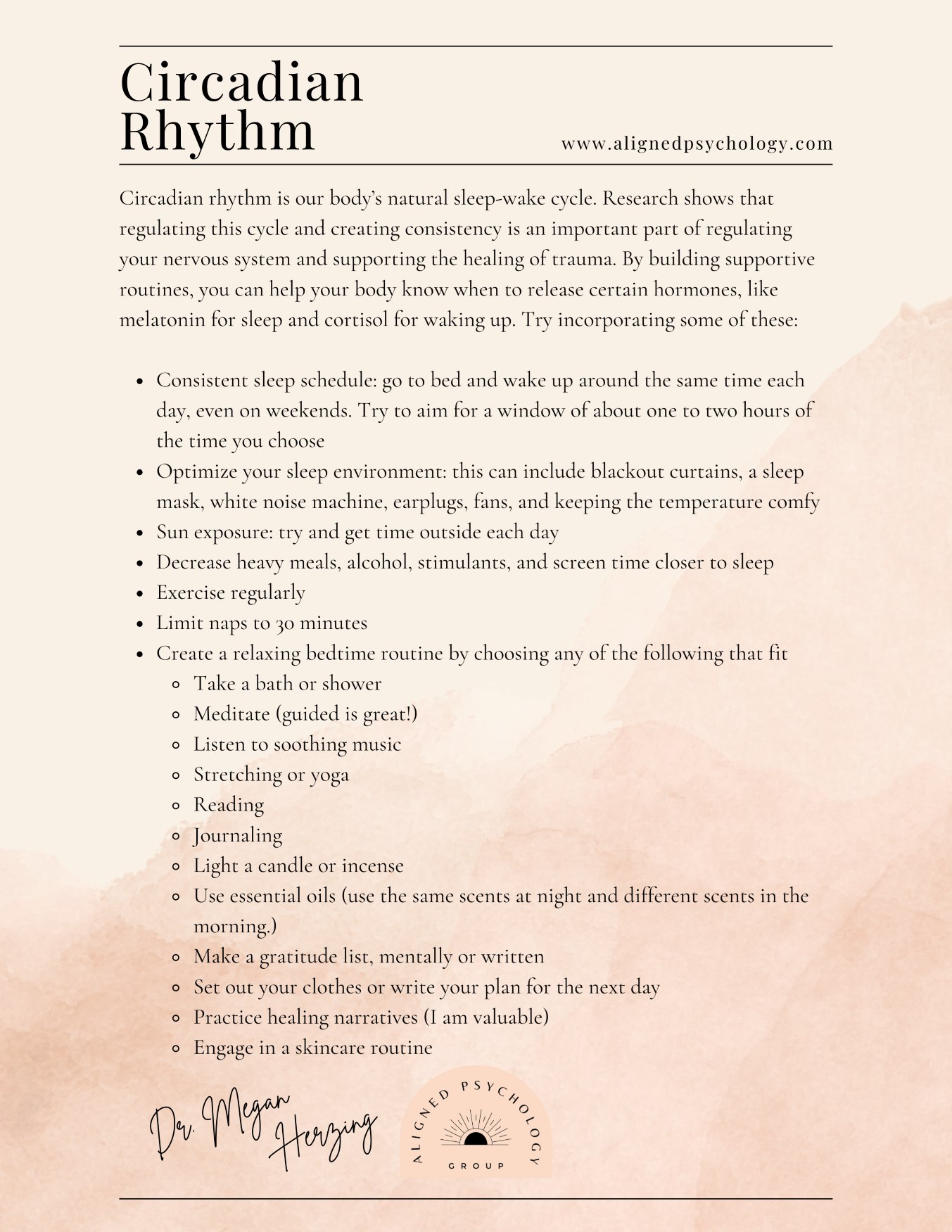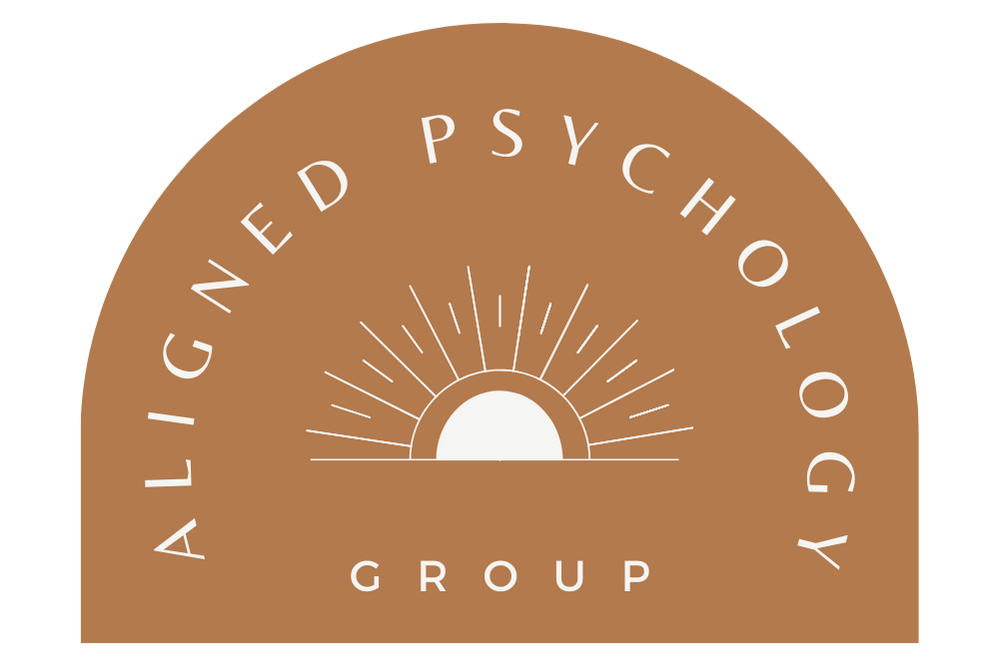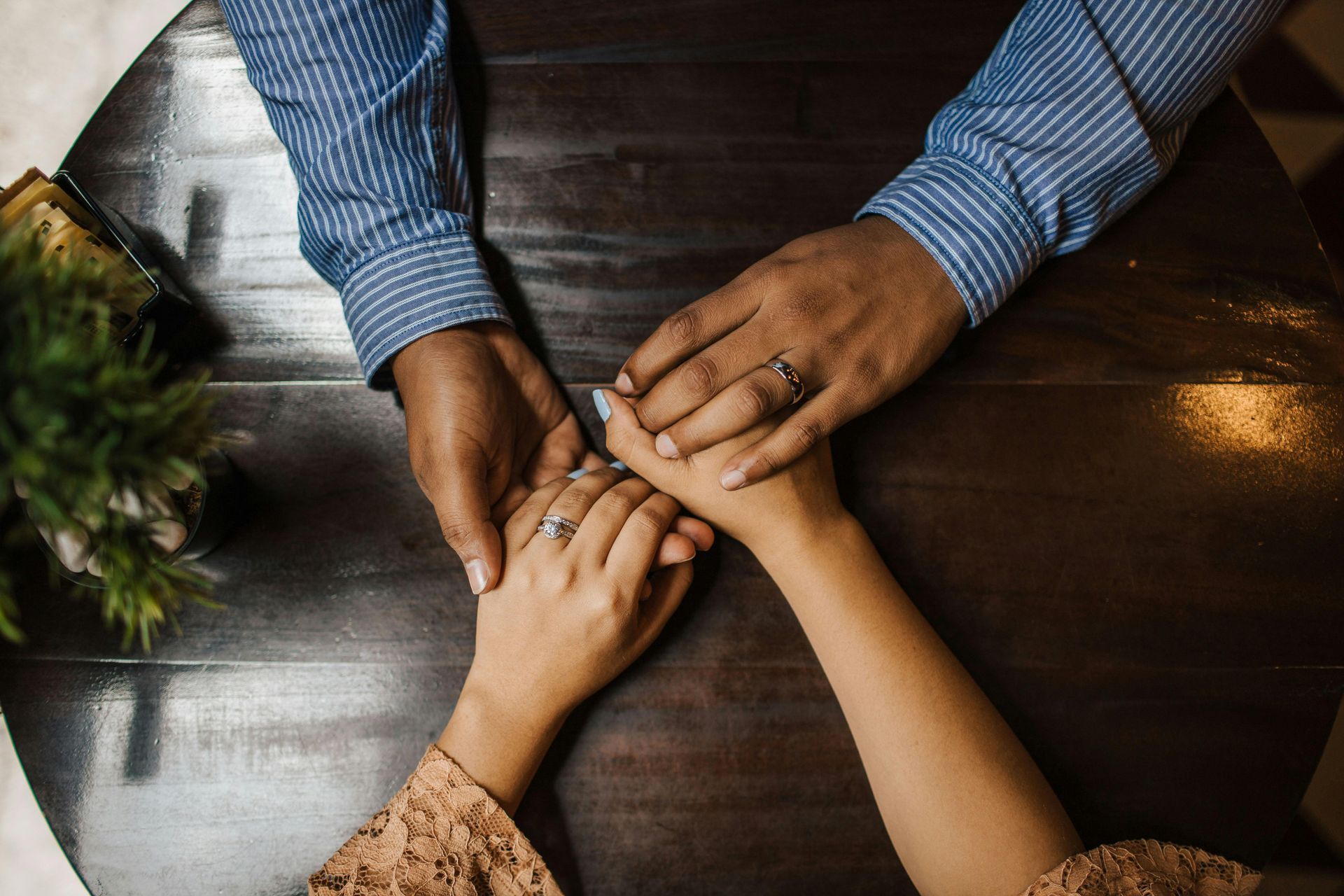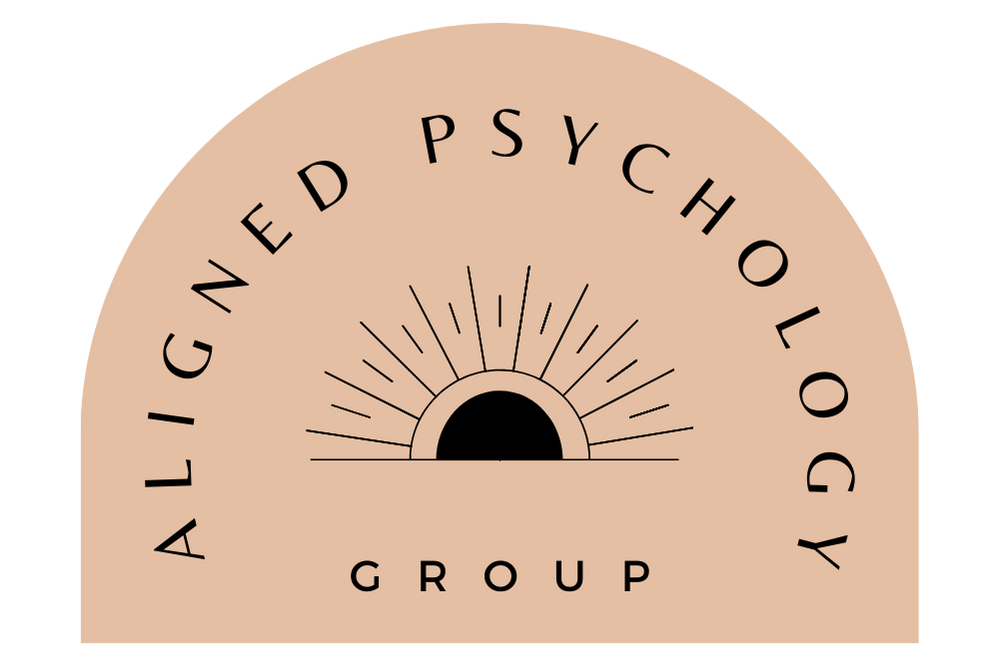Trauma Therapy Homework - Week 8
Week 8: (The Basics)
Circadian Rhythm
When it comes to trauma therapy, one often-overlooked but deeply impactful aspect of healing is the regulation of your circadian rhythm—your body’s natural sleep-wake cycle. Developing a consistent circadian rhythm can provide a sense of stability, improve emotional regulation, and help the brain process and heal from trauma more effectively. This post will explore why circadian rhythm matters, the science behind its connection to mental health, and practical steps you can take to support it. When reading this, be gentle with yourself. It isn’t about getting it perfect or right—it’s about making small changes to get your circadian rhythm more consistent. Progress is the goal, and even incremental improvements can have a meaningful impact. Approach this process with curiosity and self-compassion, knowing that every step you take is a step toward healing.
What is Circadian Rhythm?
Your circadian rhythm is an internal 24-hour clock that regulates various physiological processes, including sleep, wakefulness, digestion, and hormone production. This rhythm is influenced by external cues such as light, temperature, and daily routines. When your circadian rhythm is consistent, your body knows when to release certain hormones like melatonin (to help you sleep) or cortisol (to help you wake up).
However, disruptions to this rhythm—from irregular sleep patterns, trauma, or lifestyle factors—can lead to a cascade of physical and mental health challenges. Trauma survivors, in particular, often experience dysregulated sleep cycles, which can exacerbate symptoms like hypervigilance, fatigue, and emotional instability. By focusing on stabilizing your circadian rhythm, you’re not just improving your sleep; you’re supporting your brain’s ability to heal.

The Science Behind Circadian Rhythm and Mental Health
Research consistently shows that maintaining a regular circadian rhythm is crucial for mental health. When your sleep-wake cycle is stable, your brain is better equipped to regulate mood, process emotions, and consolidate memories. Conversely, irregular sleep patterns can increase the risk of increased anxiety, depression, and PTSD symptoms.
Studies have found that the brain operates most efficiently when you align your sleep with natural light-dark cycles and that going to bed before 11 p.m. allows your brain to enter deep, restorative sleep phases where essential healing processes occur. During these phases, your brain activates delta brain waves, which are associated with deep relaxation, memory consolidation, and emotional processing. Missing these critical windows can leave you feeling more stressed, emotionally raw, and cognitively foggy the next day.
For trauma survivors, this restorative sleep is especially important because it helps the brain reprocess traumatic memories in a safe and controlled way. Without sufficient quality sleep, the brain’s ability to manage emotional triggers and stress is significantly compromised.
The Role of Sleep Hygiene in Trauma Recovery
One of the most effective ways to support a healthy circadian rhythm is by practicing good sleep hygiene. Sleep hygiene refers to the habits and routines you create around sleep to ensure a restful and consistent night’s sleep. By building a sleep routine, you send signals to your brain that it’s time to wind down, making it easier to fall and stay asleep.
Here are some key principles of sleep hygiene:
1. Consistent Sleep Schedule
Go to bed and wake up at the same time every day, even on weekends. Aim for a one- to two-hour window to keep your body’s internal clock steady.
2. Limit Exposure to Artificial Light
Reduce screen time at least an hour before bed. Blue light from phones, tablets, and computers can interfere with melatonin production, making it harder to fall asleep.
3. Create a Relaxing Bedtime Routine
Engage in calming activities before bed, such as reading, journaling, meditating, or taking a warm bath. This helps signal to your brain that it’s time to wind down.
4. Optimize Your Sleep Environment
Make your bedroom a sanctuary for sleep. Keep it dark, cool, and quiet. Use blackout curtains, white noise machines, a sleep mask, earplugs or fans if needed.
5. Avoid Stimulants Late in the Day
Caffeine, nicotine, and even sugar can interfere with your ability to relax and fall asleep. Try to avoid these substances in the afternoon and evening.
6. Be Mindful of Food and Drink
Avoid heavy meals or alcohol close to bedtime. While alcohol may make you feel drowsy initially, it disrupts deep sleep later in the night.
7. Exercise Regularly
Physical activity during the day can improve sleep quality, but avoid intense workouts close to bedtime as they can be stimulating.
8. Limit Naps
While naps can be helpful if you’re truly exhausted, try to keep them under 30 minutes and avoid napping late in the afternoon.
9. Manage Stress and Anxiety
Engage in stress-reducing activities during the day, such as mindfulness, breathing exercises, or therapy, to prevent worry from interfering with your sleep.
10. SUN EXPOSURE
Try and get a little time in the sun/outside each day, especially before sunset.
Why Consistency Matters
For trauma survivors, consistency in your circadian rhythm can create a sense of safety and predictability. Trauma often disrupts feelings of control, and regular routines can help restore a sense of stability. Over time, these habits can rewire your brain, helping it move out of a state of hypervigilance and into a more regulated, balanced state. It’s important to remember, though, that perfection is not the goal. Life happens, and there will be nights when your routine gets interrupted or you struggle to stick to it. What matters most is your effort to return to consistency as often as you can.
Be gentle and compassionate with yourself when things don’t go as planned. Recognize that even small, incremental steps toward regularity can make a significant difference over time. By giving yourself grace, you’re fostering a nurturing relationship with yourself, which is a vital part of trauma recovery. Each attempt to follow your routine reinforces the message that you are prioritizing your well-being and creating a safe space for healing. Focus on progress, not perfection, and celebrate the small victories—they add up to meaningful change.


Building a Sleep Routine for Trauma Recovery
Creating a sleep routine is about building a sequence of actions that cue your brain to slow down and prepare for rest. Here are some examples of what you can add into your sleep routine, pick one or more that resonates:
Take a bath or shower
Meditate (this can be a guided video, a visualization, or using an app you like)
Listen to soothing music
Stretching or yoga
Light a candle or incense
Use essential oils
(Use the same scents at night to create associations between the scent and
sleep. Use different scents in the morning.)
Make a gratitude list (this can be in your head it does not have to be written)
Set your clothes up the night before for the next day
Practice healing narratives (My needs are valid. I am worthy.)
Write a plan for the next day
Create a skincare routine
Medical Disclaimer
If you’ve consistently tried these techniques and still struggle with falling asleep, staying asleep, restless sleep, or waking up anxious it may be time to consult a medical professional. Start by speaking with your primary care doctor, who can assess your symptoms and, if needed, refer you for a sleep study. Conditions like insomnia or other sleep disorders often require medical treatment in addition to working on your circadian rhythm and sleep routine. There are various medications available that can support sleep health if these interventions are not working, even one specifically designed to address PTSD-related nightmares. If you’re open to exploring medication as a resource, discuss this with your doctor to find the best approach for your needs.
Trauma Disclaimer
If you’ve recently experienced a traumatic event, one of the most powerful ways to support your brain, body, and nervous system is through rest and sleep. Research shows that sleep plays a critical role in processing emotional experiences, consolidating memories, and reducing the intensity of traumatic stress. In fact, studies suggest that adequate sleep after a traumatic incident can help lower the risk of developing long-term trauma responses, such as PTSD. Think of trauma as an injury to the brain and nervous system—just like a physical wound needs rest to heal, so does your mind. Allow yourself the freedom to sleep whenever your body calls for it. Sleep in, take naps, or go to bed earlier than usual. There’s no such thing as “too much sleep” in the aftermath of trauma—your body is doing the hard work of recovery beneath the surface. Rest isn’t a luxury; it’s a vital part of healing. By giving yourself permission to slow down and prioritize sleep, you’re actively supporting your brain’s natural ability to process and recover from distressing events. Listen to your body—it knows what it needs.
Final Thoughts
Regulating your circadian rhythm through consistent sleep patterns and good sleep hygiene is not just about getting more rest—it’s about creating the conditions for deep emotional and physical healing. By aligning your sleep-wake cycle with your body’s natural rhythms, you can support your brain’s ability to process trauma, regulate emotions, and restore a sense of balance in your life. It may take time to establish these habits, but each small step you take is a meaningful investment in your healing journey. So tonight, take a moment to power down, breathe deeply, and give yourself permission to rest—you deserve it.
FREE Downloadable Handouts
Click this
LINK
for free access to downloadable PDFs from the Trauma Therapy Homework Series. You’ll be directed to my Google Drive folder, where you can explore all the handouts created so far. You can choose between a digital format for easy viewing on your device or a printable version if you prefer a hard copy.
Here is a preview of this week's handout! Click the link above to get your own free pdf copy.


ABOUT THE AUTHOR
Dr. Megan
Megan Herzing PsyD, Licensed Professional Clinical Counselor, specializes in trauma therapy and creating a safe, supportive space for healing. She integrates evidence-based modalities, including EMDR, Internal Family Systems (IFS), somatic therapy, and Emotionally Focused Therapy (EFT), to address the mind-body connection and empower clients on their journey to wellness. With extensive experience treating complex PTSD, anxiety, attachment injuries, and dissociation, she believes in the power of self-compassion and authentic connection to facilitate lasting change. Drawing from her own healing journey, she brings empathy and lived experience to her work, honoring each client’s unique path toward growth and resilience.
Thank you for being part of a community of humans that deeply cares about healing.
We are honored that you stopped by and hope our resources will continue to bring value to your life.
We are accepting new clients in California, and referrals are always appreciated.












